Key takeaways:
- Community housing development is vital for fostering belonging and meeting residents’ diverse needs through careful planning and engagement.
- Self-advocacy equips individuals with the skills to articulate their housing needs and navigate complex systems, promoting resilience and confidence.
- Building relationships with housing advocates provides support and amplifies individuals’ voices in addressing housing challenges.
- Sharing personal advocacy experiences fosters community connections and empowers others to take action in their own housing journeys.
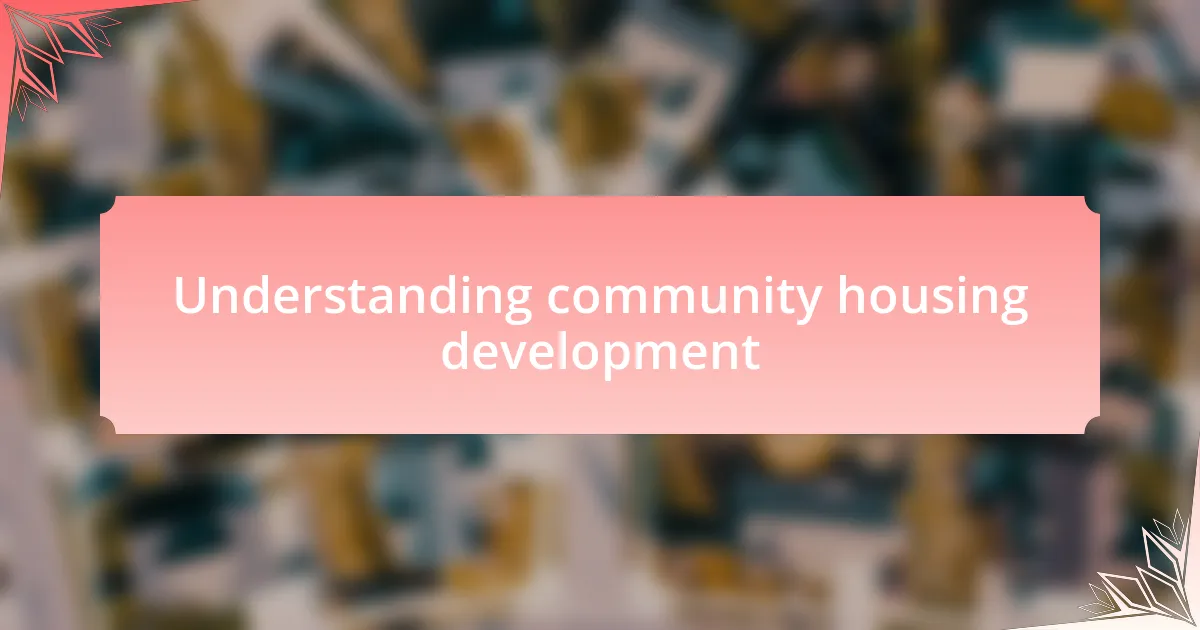
Understanding community housing development
Community housing development is the process of creating affordable housing options for individuals and families in need. I remember attending a meeting where residents shared their stories about struggling to find stable housing. It struck me how essential this development was not just for providing shelter but for fostering a sense of belonging and community.
As I delved deeper, I learned that community housing isn’t merely about bricks and mortar; it’s about creating environments where people can thrive together. Have you ever considered how a well-designed space can uplift spirits and encourage social interaction? I felt proud when I saw how thoughtful planning transformed neighborhoods, bridging divides and building connections among diverse residents.
The importance of involving community members in the planning process cannot be understated. When I participated in local advisory boards, I witnessed firsthand how their insights shaped more than just housing designs; they ultimately crafted homes that respected their culture and needs. It made me question, how can we ensure that every voice is heard in these vital conversations? Engaging directly with potential residents creates a sense of ownership and accountability that benefits the entire community.
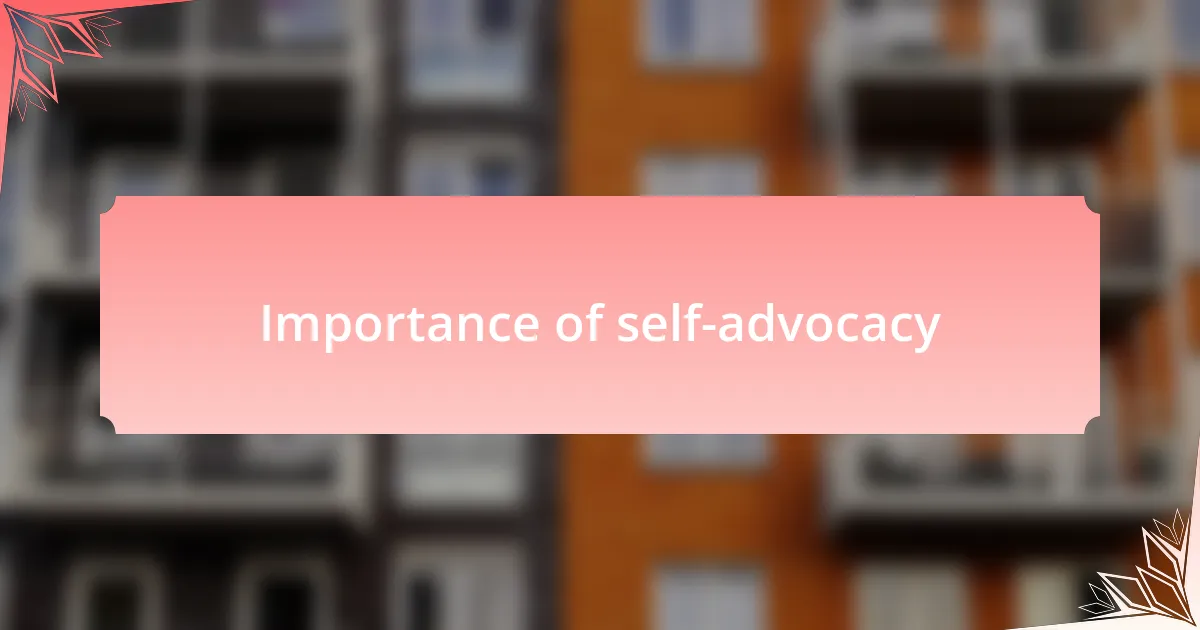
Importance of self-advocacy
Self-advocacy is a crucial skill that empowers individuals to navigate complex systems, particularly in community housing. I recall attending a workshop where we practiced voice modulation and assertiveness. This experience made me realize that expressing our needs clearly can transform the way services respond to us. Why should anyone else decide what’s best for us when we can articulate our own needs?
Taking charge of my own advocacy journey taught me the importance of understanding my rights and available resources. I remember a time when I faced challenges with my housing—educating myself about tenant rights not only brought me peace of mind but also equipped me to stand up for myself. Have you ever felt lost in a sea of policies and documentation? When I learned to navigate those waters, I discovered that my voice had power, and that realization was liberating.
Moreover, self-advocacy fosters resilience and confidence, both vital in community housing contexts. In group discussions, I often found myself sharing stories of setbacks, only to realize others faced similar challenges. Each shared experience reinforced a collective strength; together, we learned to advocate not just for ourselves but for one another. Isn’t it empowering to know that, by speaking out, we can create a supportive community willing to fight for its members?
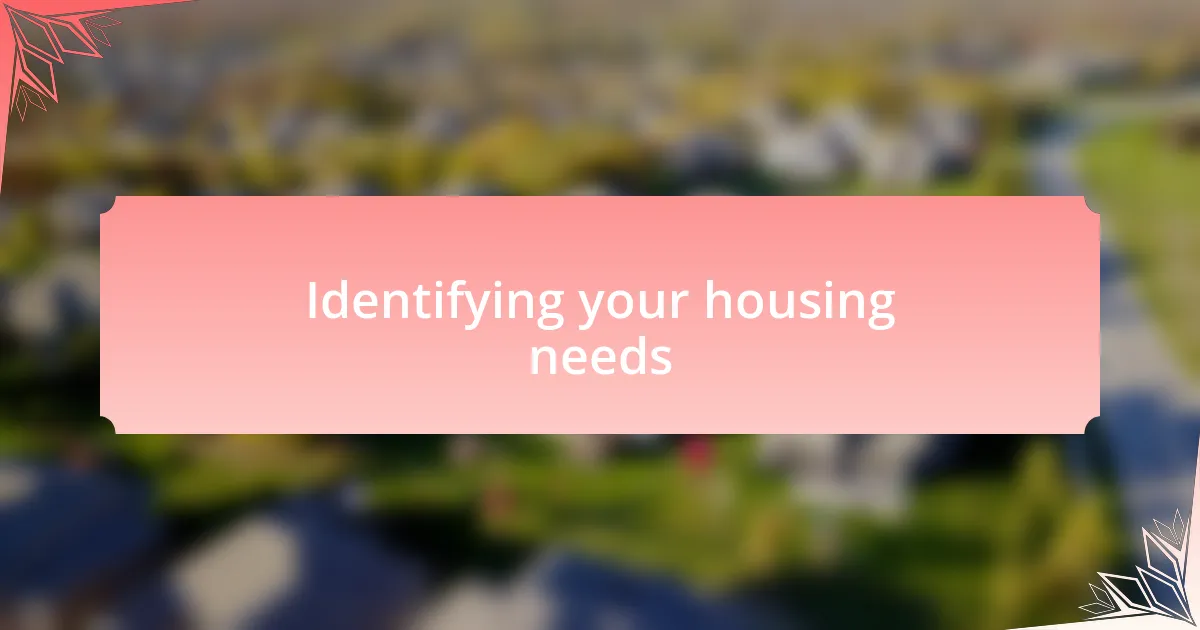
Identifying your housing needs
Understanding your housing needs begins with self-reflection. I once sat down with a notepad to list what I truly desired in my living space. Was it just affordability, or did I crave a sense of safety and community? This exercise helped me clarify my priorities in a way that was both enlightening and liberating. Have you ever taken the time to think deeply about what would make your home feel welcoming?
Next, it’s essential to assess your circumstances realistically. When I found myself juggling work and study, I realized my need for a quiet place to focus was more critical than I’d previously thought. I began to consider not just my immediate preferences but also my long-term goals. What are the factors that could affect your housing situation in the future? Identifying these can prepare you for changes and help you advocate for the living environment you truly need.
Finally, engage in dialogues with those around you—friends, family, or support groups. I remember discussing my housing needs with a neighbor who had been through a similar journey. Her insights made me rethink what I required versus what I wanted. How many voices and experiences could enhance your understanding of what constitutes the ideal housing scenario for you? Reaching out can uncover options you hadn’t considered before and make the process feel less isolating.
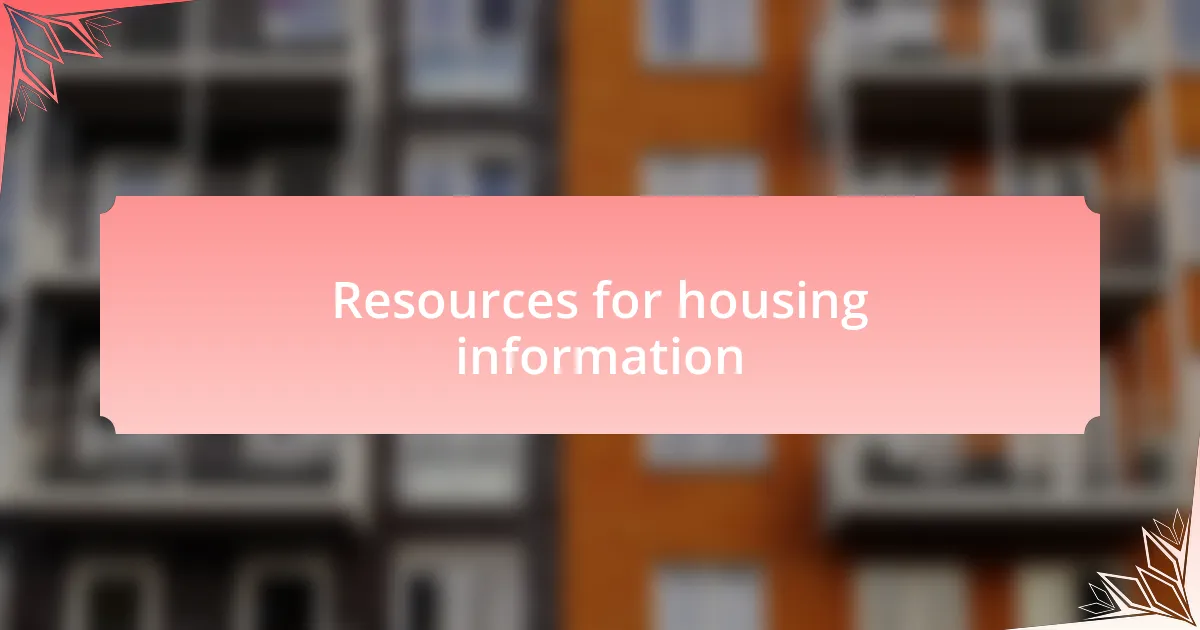
Resources for housing information
Many resources are available to help you navigate the complexities of housing information. I remember when I first dipped my toes into the world of community housing; I turned to local organizations that specialize in housing assistance. Their websites not only provided listings of available homes but also offered insight into tenant rights and financial aid opportunities. Have you ever tapped into local resources that made a significant difference in your search for housing?
Another valuable resource is online databases that focus on community housing development. I often found myself poring over websites that compile information on affordable housing options. These platforms typically allow users to filter search results based on specific needs, like location and budget. I recall discovering a hidden gem—a small, supportive community that wasn’t widely known but fit my needs perfectly. How often do we overlook what’s right in front of us simply because we aren’t searching in the right places?
Lastly, never underestimate the power of social media and community forums. I joined a few local groups online, and it was like stumbling onto a treasure trove of knowledge. Members shared their housing success stories and challenges, providing firsthand experiences that were incredibly enlightening. Have you considered how engaging with a community could open doors to opportunities you hadn’t thought possible? These interactions laid the groundwork for my advocacy, empowering me to seek out what best suited my unique situation.
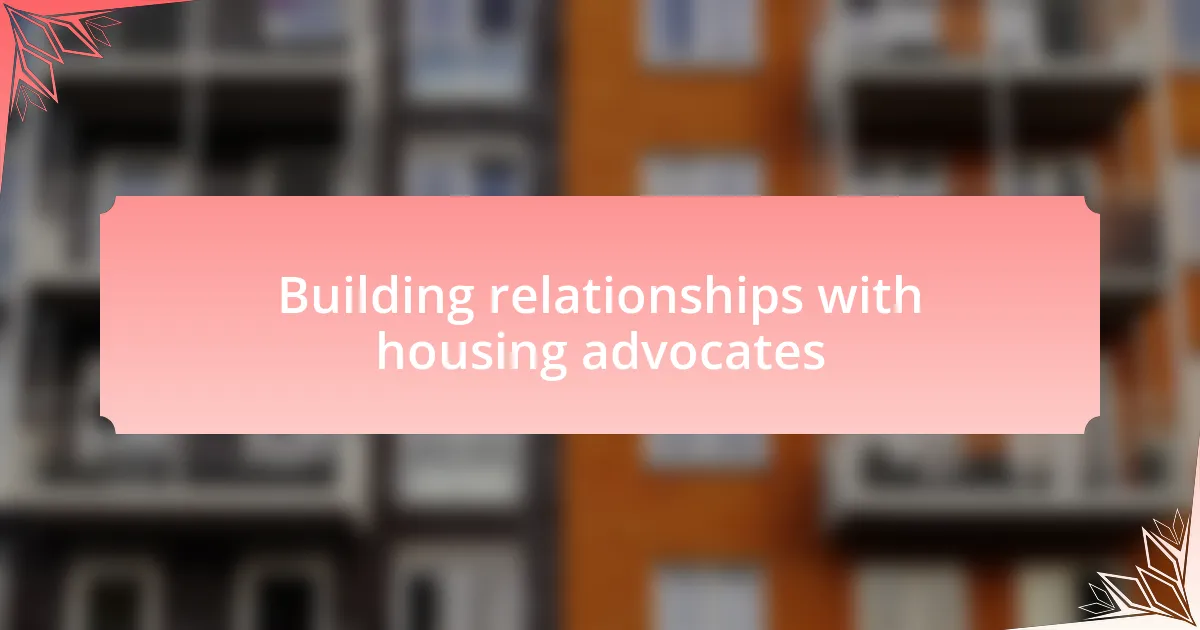
Building relationships with housing advocates
Building relationships with housing advocates has been a game changer for me. When I first reached out to advocates in my area, I was struck by their genuine willingness to help. Instead of feeling overwhelmed, I found my worries easing as someone listened to my concerns. Have you ever felt that sense of relief when someone understands your struggles?
One memorable experience was when I attended a community meeting hosted by a local housing advocate. I remember feeling nervous standing in front of a group of strangers, but as I shared my story, I realized how similar our experiences were. The shared empathy that filled the room truly illustrated the strength in our community. It’s fascinating how having someone in your corner can amplify your voice when navigating housing issues, isn’t it?
Since then, I’ve nurtured those relationships, often reaching out for advice or sharing updates on my housing journey. I’ve learned that these advocates aren’t just resources; they can become allies in your quest for secure housing. Have you thought about how your journey could change with a strong support network by your side?
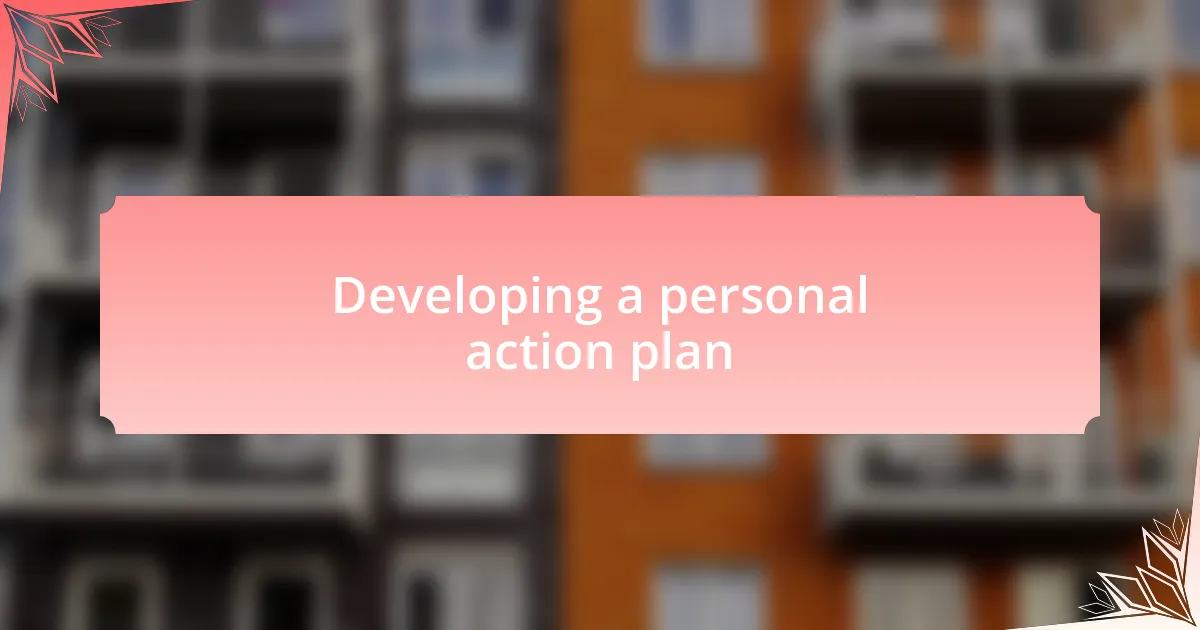
Developing a personal action plan
Developing a personal action plan is essential for effective self-advocacy in housing matters. When I first created mine, I wrote down specific goals, like understanding my rights as a tenant and identifying local resources to assist me. That clarity made all the difference—it transformed my anxiety into empowerment, allowing me to approach challenges with confidence and purpose.
I vividly remember sitting on my couch, pen in hand, brainstorming what steps I needed to take. I began by listing potential hurdles, from securing paperwork to navigating local housing laws. It felt daunting at first, but breaking it down into manageable tasks helped alleviate some of that initial fear. Have you ever experienced that moment when a seemingly overwhelming challenge suddenly feels achievable? For me, it’s about transforming chaos into a clear path forward.
Ultimately, a well-structured personal action plan serves as a roadmap. I set deadlines for myself, whether it was reaching out to a new advocate or attending a workshop on tenant rights. These deadlines not only kept me accountable but also instilled a sense of urgency in my journey. Can you picture how having a defined plan could make your advocacy efforts more focused and effective? By taking those deliberate steps, I found my voice and learned how to fight for what I deserve in housing.
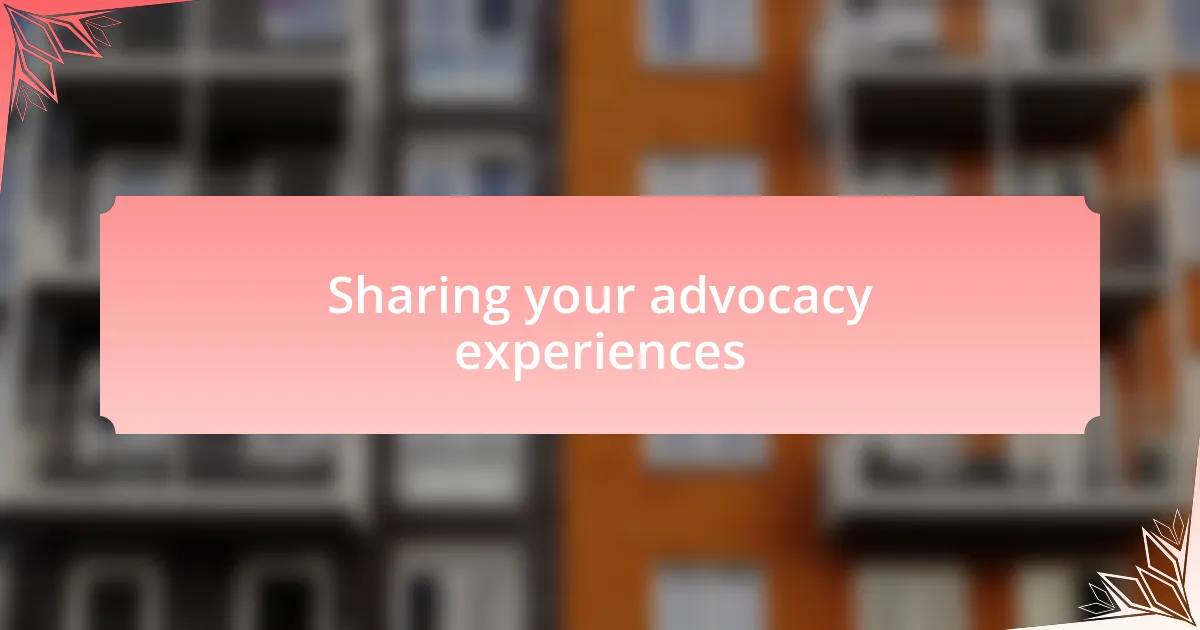
Sharing your advocacy experiences
As I began to advocate for myself, I soon realized the power of sharing my journey with others. I remember an evening at a community meeting when I spoke about my challenges finding accessible housing. The responses I received were eye-opening; people shared their own experiences and struggles, creating a sense of camaraderie. Have you ever felt that rush of connection when others resonate with your story? It’s a powerful reminder that advocacy can be a communal effort.
In another instance, I decided to write a blog post detailing my personal experiences navigating housing issues. I poured my heart into that piece, discussing not only my struggles but also the small victories along the way. The feedback was incredible! Others reached out to share how my story inspired them to take action in their own lives. Isn’t it amazing how simply sharing your vulnerability can lay the groundwork for someone else’s empowerment?
Reflecting on these moments, I believe that sharing experiences fosters growth—not just for ourselves, but also for our community. We learn from one another, carving out new pathways and building support networks that help us tackle shared challenges. What would our advocacy landscapes look like if we all committed to sharing our stories more openly? Each shared experience not only amplifies our voices but also strengthens our collective power for change.